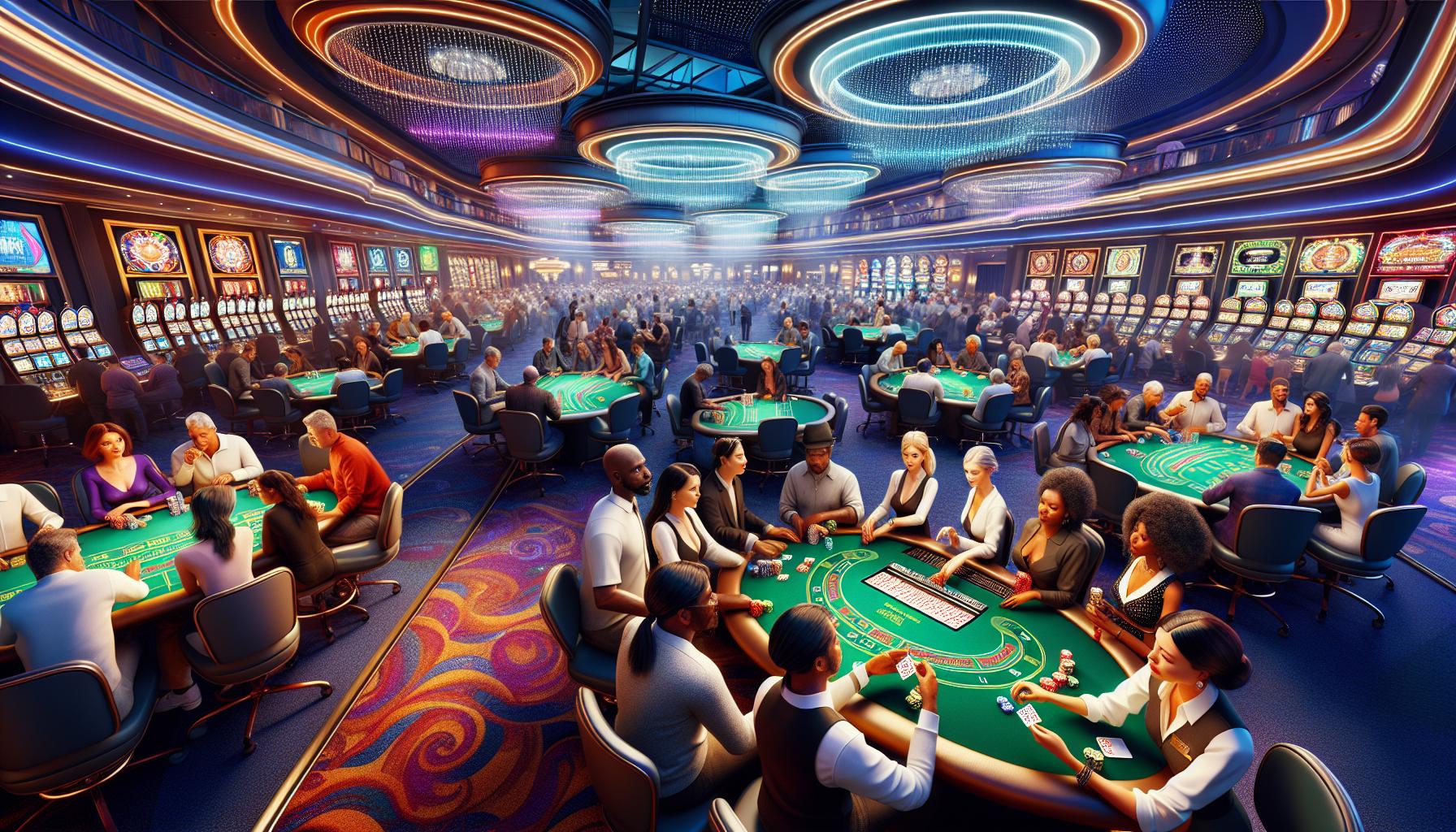When it comes to gaming in the Magnolia State, the Mississippi Gaming Commission plays a crucial role in shaping the landscape. As an avid follower of the gaming industry, I find it fascinating how this regulatory body ensures fair play and promotes responsible gaming practices. Established in 1992, the Commission oversees all gaming operations in Mississippi, from riverboat casinos to land-based establishments.
Understanding the Commission’s functions and regulations not only highlights its impact on the local economy but also reveals how it fosters a safe gaming environment. Whether you’re a seasoned gambler or just curious about the gaming scene, exploring the Mississippi Gaming Commission’s role offers valuable insights into this vibrant industry.
Key Takeaways
- Regulatory Authority: The Mississippi Gaming Commission, established in 1992, serves as the primary regulatory body overseeing all gaming operations in the state, ensuring compliance with laws and promoting fair play.
- Economic Impact: The gaming industry significantly contributes to the local economy, generating approximately $2.2 billion in annual revenue and creating over 25,000 direct jobs, along with additional indirect employment opportunities.
- Responsible Gaming Initiatives: The Commission actively promotes responsible gaming by implementing programs to combat gambling addiction and providing resources for affected individuals, ensuring a safe gaming environment.
- Legislative Evolution: Key legislative changes, such as the 2005 Mississippi Gaming Control Act and the legalization of sports betting in 2018, have shaped the gaming landscape and enhanced the Commission’s authority.
- Challenges and Competition: The Commission faces ongoing challenges, including addressing gambling addiction and competition from neighboring states in the gaming industry, requiring ongoing evaluation of regulatory frameworks.
- Comprehensive Oversight: Through licensing operators and conducting regular inspections, the Commission ensures accountability and integrity within the gaming facilities it regulates, fostering a trustworthy environment for players.
Mississippi Gaming Commission
The Mississippi Gaming Commission functions as the primary regulatory body for the gaming industry in Mississippi. Established in 1992, this Commission exercises authority over all gambling-related activities within the state, including oversight of 30 casinos and numerous gaming facilities.
The Commission’s responsibilities encompass licensing operators, enforcing gaming laws, and ensuring compliance with state regulations. By promoting fair play, the Commission safeguards both players and operators, contributing to a trustworthy gaming environment. The Commission also addresses issues related to responsible gaming, working actively to promote safer gambling practices and help those affected by problem gambling.
Significantly, the Mississippi Gaming Commission plays a vital role in the local economy. According to reports, the gaming industry generates billions in revenue annually, providing thousands of jobs in various sectors. The Commission’s ongoing efforts to sustain a safe and regulated gaming landscape strengthen the state’s economy and provide a balanced approach to entertainment and revenue generation.
History of Mississippi Gaming Regulation

The history of gaming regulation in Mississippi reflects significant developments that shaped the state’s gaming industry. The Mississippi Gaming Commission’s establishment in 1992 marked the beginning of formal regulation, setting the foundation for a comprehensive framework governing all forms of gaming within the state.
Establishment and Early Years
The Mississippi Gaming Commission was established in response to the growing interest in legalized gaming. In 1990, the state adopted legislation allowing riverboat casinos, which created a new avenue for economic growth. By 1992, the Commission began operations, tasked with overseeing licensing, regulation, and enforcement. The emphasis was on ensuring integrity and compliance among the 30 casinos operating primarily along the Mississippi River. During these early years, the Commission focused on developing regulations that promoted responsible gaming, protecting both players and operators in this emerging market.
Major Legislative Changes
Significant legislative changes occurred following the Commission’s establishment, impacting gaming regulations. In 2005, the state passed the Mississippi Gaming Control Act, which streamlined the regulatory process and enhanced the Commission’s authority over gaming operations. This legislation allowed for land-based casinos, expanding the industry’s potential. Additionally, advancements in technology necessitated new regulations regarding online gaming and sports betting, culminating in the 2018 legalization of sports wagering following the repeal of the federal ban. Each legislative shift aimed to further legitimize and regulate the gaming landscape, ensuring the industry remained both fair and economically beneficial for Mississippi.
Functions of the Mississippi Gaming Commission

The Mississippi Gaming Commission plays a crucial role in overseeing the state’s gaming industry. Its essential functions include licensing operators, ensuring compliance with laws, and enforcing regulations.
Licensing and Regulation
The Commission is responsible for the licensing of all gaming operators within Mississippi. This process involves thorough background checks on all operators and their key personnel. The aim is to assess their financial stability and integrity before granting licenses. The Commission also sets regulatory standards for gaming facilities and monitors adherence to state laws. By licensing over 30 casinos, the Commission maintains a landscape that prioritizes fair play and accountability.
Compliance and Enforcement
Compliance and enforcement are critical responsibilities of the Mississippi Gaming Commission. The Commission conducts regular inspections to ensure that gaming facilities comply with state regulations. It addresses violations, which may include fines or sanctions against operators, ensuring a fair gaming environment. Moreover, the Commission promotes responsible gaming practices by monitoring problem gambling initiatives and offering resources for those affected. Through these efforts, the Commission safeguards both players and the integrity of the gaming industry in Mississippi.
Impact on the Mississippi Economy

The Mississippi Gaming Commission plays a vital role in bolstering the state’s economy. The gaming industry generates significant employment opportunities and substantial revenue.
Job Creation and Employment
The gaming sector in Mississippi provides over 25,000 direct jobs within casinos and gaming venues. These positions range from dealers and servers to managerial roles. Additionally, the industry stimulates indirect job creation in sectors such as hospitality, transportation, and retail. A report by the American Gaming Association indicates that for every direct job in gaming, two additional jobs arise in the surrounding economy, demonstrating the far-reaching impact of this sector on employment.
Revenue Generation
The Mississippi Gaming Commission oversees an industry that generates approximately $2.2 billion annually in gaming revenue. This income contributes to state and local economies through taxes, with roughly $300 million directed to the state’s budget each year. These funds support essential services like education, infrastructure, and public safety. Furthermore, the influx of tourism generated through gaming attracts millions of visitors annually, enhancing local businesses and contributing to economic growth.
Current Issues and Challenges
The Mississippi Gaming Commission faces several key issues and challenges that impact its regulatory efforts and the gaming industry as a whole. The focus remains on gambling addiction and competition from neighboring states.
Gambling Addiction and Responsible Gaming
Gambling addiction presents a significant challenge for the Mississippi Gaming Commission. The Commission actively promotes responsible gaming initiatives, implementing programs designed to educate players on the risks of gambling and providing resources for those affected by problem gambling. Partnerships with organizations like the National Council on Problem Gambling enhance outreach efforts and support. The Commission monitors gaming facilities for compliance with responsible gaming policies, such as offering self-exclusion programs and training staff to identify at-risk patrons. Frequent evaluations of these programs ensure they meet the evolving needs of the community.
Competition from Neighboring States
Competition from neighboring states poses another challenge for the Mississippi Gaming Commission. With many states legalizing gaming, including online and sports betting, Mississippi casinos face pressure to innovate and retain market share. The emergence of gaming options in states like Louisiana and Arkansas draws customers away, impacting revenue and job creation. In response, the Commission must evaluate regulatory frameworks and explore new gaming opportunities, such as mobile sports betting, to maintain a competitive edge. Adapting to shifting consumer preferences and technological advancements remains critical for sustaining the state’s gaming industry.



